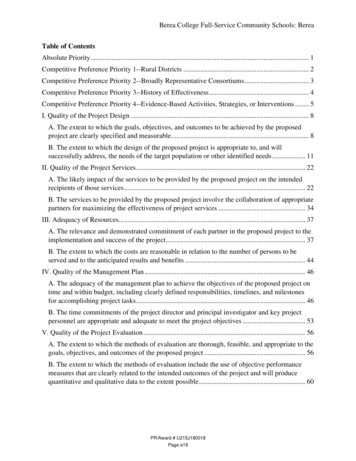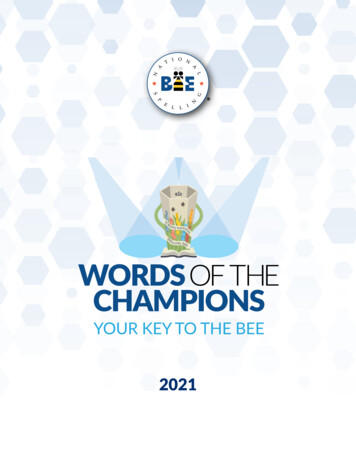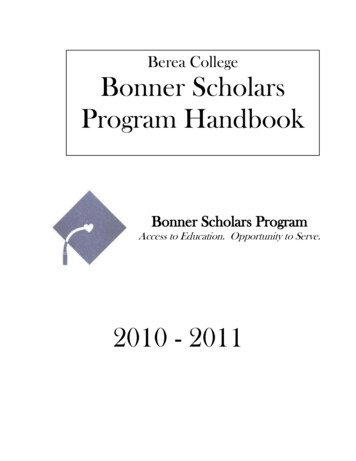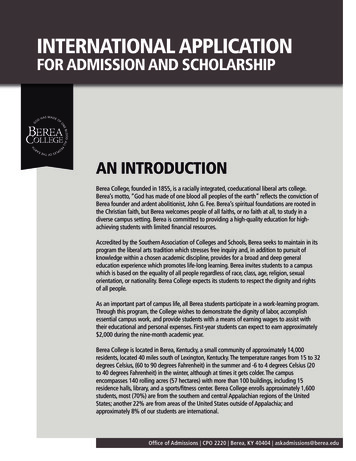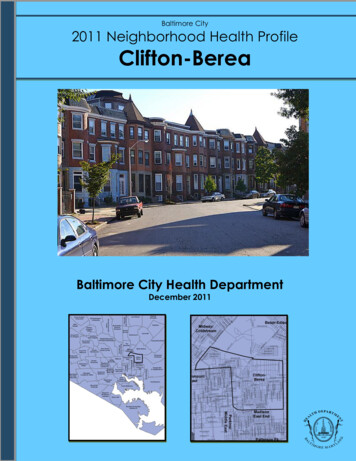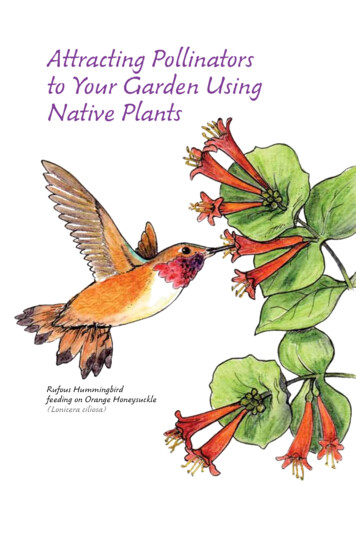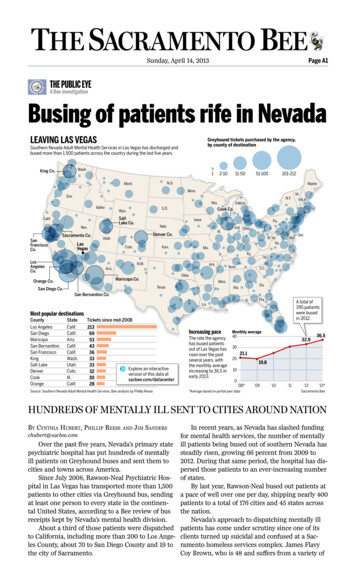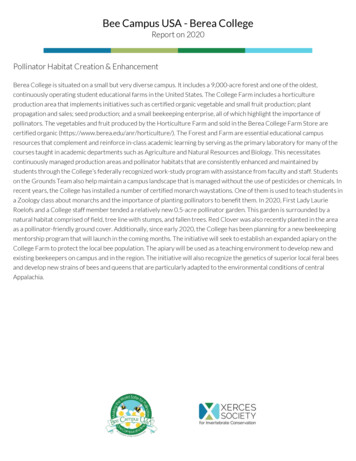
Transcription
Bee Campus USA - Berea CollegeReport on 2020Pollinator Habitat Creation & EnhancementBerea College is situated on a small but very diverse campus. It includes a 9,000-acre forest and one of the oldest,continuously operating student educational farms in the United States. The College Farm includes a horticultureproduction area that implements initiatives such as certified organic vegetable and small fruit production; plantpropagation and sales; seed production; and a small beekeeping enterprise, all of which highlight the importance ofpollinators. The vegetables and fruit produced by the Horticulture Farm and sold in the Berea College Farm Store arecertified organic (https://www.berea.edu/anr/horticulture/). The Forest and Farm are essential educational campusresources that complement and reinforce in-class academic learning by serving as the primary laboratory for many of thecourses taught in academic departments such as Agriculture and Natural Resources and Biology. This necessitatescontinuously managed production areas and pollinator habitats that are consistently enhanced and maintained bystudents through the College’s federally recognized work-study program with assistance from faculty and staff. Studentson the Grounds Team also help maintain a campus landscape that is managed without the use of pesticides or chemicals. Inrecent years, the College has installed a number of certified monarch waystations. One of them is used to teach students ina Zoology class about monarchs and the importance of planting pollinators to benefit them. In 2020, First Lady LaurieRoelofs and a College staff member tended a relatively new 0.5-acre pollinator garden. This garden is surrounded by anatural habitat comprised of field, tree line with stumps, and fallen trees. Red Clover was also recently planted in the areaas a pollinator-friendly ground cover. Additionally, since early 2020, the College has been planning for a new beekeepingmentorship program that will launch in the coming months. The initiative will seek to establish an expanded apiary on theCollege Farm to protect the local bee population. The apiary will be used as a teaching environment to develop new andexisting beekeepers on campus and in the region. The initiative will also recognize the genetics of superior local feral beesand develop new strains of bees and queens that are particularly adapted to the environmental conditions of centralAppalachia.
Planting the pollinator garden near the President’sHome (Photographer: Laurie Roelofs).Bees enjoying the President’s Home pollinatorgarden. (Photographer: Laurie Roelofs)The pollinator garden near the President’s Home.(Photographer: Laurie Roelofs)Education & OutreachOn March 13, 2020, Berea College ceased all in-person classroom instruction, and most students were sent home tocomplete the term through distance learning as the COVDI-19 virus began to spread rapidly across the country and theworld. This shift led to unprecedented challenges as all campus community members developed new approaches tolearning and work. Although the College reopened for the 2020-21 academic year for those who wished to return toBerea for an on-campus experience, a number of new policies and procedures were put into place to limit exposure to andspread of the virus, including limitations on campus visitors as well as and on- and off-campus activities(https://www.berea.edu/covid-19/). As a result, the College offered only a limited number of pollinator conservationevents during the 2020 calendar year. The College’s Forestry Outreach Center (FOC) hosted two monthly MadisonCounty pollinator group meetings in January and February before the meeting schedule was interrupted by the pandemic.The center hosted a third event in celebration of National Pollinator Week in June. This event included a socially distancedpollinator plant pick-up event and social media posts highlighting the importance of pollinators and the College’sdesignation as a Bee Campus USA such as this Facebook post from June 22, 2020: National Pollinator Week is June22nd-28th! Pollinators are an essential part of our ecosystem. Help them out by growing pollinator-friendly native plantsnear your home. We will have a limited supply of plants, so try to come early! Berea College is a designated Bee Campus bythe Xerces Society, and we have a pollinator garden growing outside of the FOC building! Check it out, along with our newinformative sign. For more information on how you can help: nt-lists The
final pollinator-friendly FOC event was a Tree Week initiative in October 2020 that highlighted pollinating trees. Theevent included a “Bioblitz” competition that challenged visitors to utilize the iNaturalist app to identify tree species in theBerea College Forest by taking photos of leaves, bark buds, fruit, and nuts. Many FOC events that would have addressedpollinator conservation were canceled in 2020, including eight school group visits scheduled for March and April, an EarthDay “Teach-in,” and a Day Camp experience in June. The College was particularly disappointed to delay the launch of itsfirst annual Forest Festival, a large event scheduled for November 2020 in collaboration with the City of Berea. Theseevents would have reached hundreds of K-12 and Berea College students as well as Berea residents and visitors from thesurrounding area. The College’s Office of Sustainability was unable to implement its typical programming in 2020,including the annual Dandelion Festival, an event that first began in 2016 to help people understand the benefits of nativepollinators and weeds such as the dandelion. The theme of the 2020 festival was “Reimagining the American Landscape,”and the event would have featured workshops, live music, activity booths, and pollinator-friendly vendors.Page two of the August 2020 Forestry OutreachCenter’s monthly newsletter, which highlighted thepollinator garden established by First Lady LaurieRoelofs.A Facebook post advertising the Forestry OutreachCenter’s Bioblitz event in October 2020.A social media post on the Forestry OutreachCenter’s Facebook page advertising the pollinatorplant pick-up event on June 24, urses & Continuing EducationThe College offered the following for-credit courses in 2019-20: Ecology Course Description This course is anintroduction to the basic ecological principles of terrestrial and aquatic systems. Emphasis is placed on experiential
learning through field and laboratory studies. Principles of energy flow, material cycles, physiological ecology, populationecology, ecological succession, community ecology, and biological diversity are addressed. Hands-on exercises andexperiments are integrated with lectures, discussion groups, student research projects, and computer exercises todemonstrate the process of scientific inquiry into ecological issues. The course is structured as two class periods and onelaboratory period each week. Ecological Weed Management Course Description A study of ecological weed controlprinciples. At least one-third of all crop losses worldwide are due to weeds. Weeds affect all areas of landscape andagricultural management: pastures, orchards, row crops, greenhouses, ornamentals, lawns, golf courses, and wilderness.Students in this course gain a broad understanding of weed management practices and a detailed understanding of how tomanage weeds in many different contexts. Intro to Agriculture Course Description An overview of ecological productionsystems managed to generate food, fiber, fuel, and other natural resources for human use and the academic disciplinesassociated with them. The course surveys the diverse natural-resource systems upon which we depend while alsoemphasizing biological systems managed for the production of renewable resources. Historical and currentunderstandings of sustainable resource use are examined and applied to evaluate local, national, and international issuesconfronting human society today. Students are introduced to the fields of agriculture, forestry, and wildlife and fisheriesmanagement, and have the opportunity to explore careers in these areas. This course is recommended for all first-yearstudents intending to major or minor in Agriculture and Natural Resources as well as any students interested in exploringthe major.
Introduction to Agriculture students examining a field of sunflowers in a pumpkin farmer’s field. They learned that the sunflowers help foster the bee pollinators necessary topollinate the pumpkin crop. (Photo credit: Nancy Gift)Service-LearningAlthough service-learning is an integral component of the high-quality liberal arts education offered at Berea College,COVID-19 restrictions limited nearly all on- and off-campus activities to ensure the health and safety of students, staff,faculty, and the wider community.
Educational SignageIn recent years, the College has installed permanent educational signage on campus and at the Forestry Outreach Centerthat offers information on pollinators, trees, and the College’s “no spray” approach to landscape management. Twoadditional permanent signs were installed in the summer of 2020 to notify the campus community and visitors of Berea’sstatus as a Bee Campus USA-certified institution. One was placed near a high-traffic gateway area of campus and thesecond was posted near a large Monarch Butterfly Waystation on the main campus. Two temporary educational noticeswere also displayed in the Fall 2020 Term to raise student awareness of endangered pollinators. One was a posterdisplayed near Dining Services and the second was a digital poster in the widely used Margaret A. Cargill Natural Sciencesand Health Building.One of two new permanent Bee Campus USA signs installed in high-traffic areas oncampus in the summer of 2020.An educational pollinator poster on a bulletin board outside of Dining Services.
Policies & PracticesBerea College uses “No Spray” practices on its main campus, meaning that no pesticides or herbicides are used todiscourage the growth of weeds, and only organic fertilizers are used on landscaped ulture/berea-college-grounds/). This allows all native plants to grow oncampus grounds. In addition to protecting the health of the campus community and pollinators, the practice is essentialbecause the College’s main campus falls on the intersection of four watersheds, and it is vital to limit pollution from waterrunoff in order to preserve the surrounding natural ecosystems. However, the College’s Grounds Management Team doesmake an effort to remove non-native plants, such as honeysuckle, given their detrimental effects on local ecosystemsbeyond their potential benefits to pollinators.Integrated Pest Management ndscape-lesson-2-0%20/Recommended Native Plant us-usa/Recommended Native Plant Supplier List: Regional Suppliers of Native Pollinators Links.docx
Permanent signage on the main campus that explains the College’s “No Spray” practices.Learn s-usa/tebana@berea.eduThe 2020 – 2021 Berea College Bee Campus USA committee. Top row, from left to right: Laurie Roelofs, First Lady; Teri Thompson(Committee Chair), Vice President for Strategic Initiatives; Dr. Nancy Gift, Compton Chair of Sustainability & Associate Professor ofEnvironmental Studies; Wendy Warren, Forestry Outreach Center Coordinator; Eric Harshman, Grounds Superintendent. Bottomrow, from left to right: Andreea Teban, Strategic Initiatives Program Associate; Kenny Holbrook, BereaCorps LEAN HorticultureProgram Associate; Rosemarie Adams, Landscape Specialist; Rachel Hidding, Student; John Abrams, Naturalist/ResearchTechnician. Not pictured: Maddy Richmond, Student
Bee Campus USA - Berea College Report on 2020 Pollinator Habitat Creation & Enhancement Berea College is situated on a small but very diverse campus. It includes a 9,000-acre forest and one of the oldest, . students through the College's federally recognized work-study program with assistance from faculty and staff. Students
